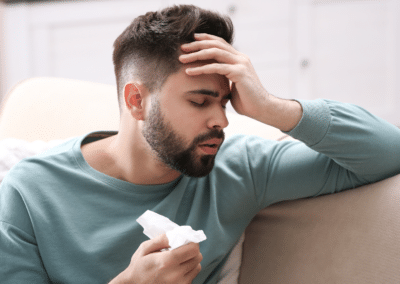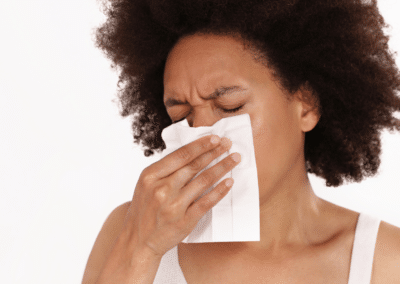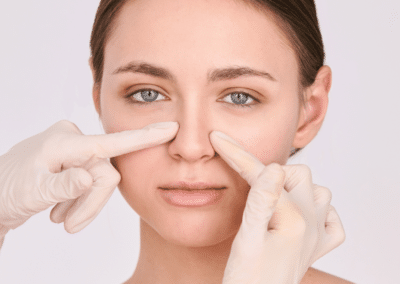Many people resist going to the doctor’s office, urgent care, or emergency room until requiring professional assistance is undeniable. Unfortunately, these can be some of the most germ-ridden places and your already immunocompromised body can easily pick up other airborne infections in a room full of people coughing, sneezing, and wheezing. Below, we look at ways you can protect yourself and keep you from getting sicker instead of better!
Risks for the Immunocompromised in Medical Settings
The highest risk infection that commonly occurs in medical settings is Clostridilides difficile – also known as C. diff. This bacterial infection causes diarrhea and inflammation of the colon. 2/3 of C. diff infections are associated with inpatient hospital stays, however, studies have found that 82% of people who came into contact with C. diff in their communities reported exposure to outpatient healthcare settings such as the doctor’s or dentist’s office in the 12 weeks before receiving the diagnosis. The CDC estimates that dealing with these infections cost U.S. hospitals approximately $4.8 billion annually and that 1 out of every 5 patients infected with healthcare-associated C. diff will become infected again.
While studies have been conducted, it is still unclear as to whether C. diff is an airborne infection or if it is spread only through direct physical contact. The bacteria is so serious that of the almost half million people afflicted with this microbial infection per year, an estimated 29,000 will die. About 80% of those deaths are from patients aged 65 and older – seniors who become afflicted have a 1 in 11 chance of dying. People who currently take or have just finished an antibiotic regimen have the highest risk of contracting C. diff.
Risks and Myths of Exposure to Illness and Bad Air Quality
There are numerous airborne illnesses with varying severity. These include measles, chickenpox, SARS, and tuberculosis. Most of these diseases are treatable or avoidable, however, they can have severe effects on the most immunocompromised among us, including infants, the elderly, and those already battling other illnesses.
As the global population grows and we are constantly in close quarters with other people, we are exposed to the risk of airborne infections on a near-daily basis. Germs hide in the most innocuous-looking places, and sometimes it is the most benign seeming objects that post the highest risk to an immunocompromised person.
Those old magazines in the waiting room. Not only are they woefully out-of-date and likely torn, but many people have flipped through those same pages (usually licking their fingers to do so). Ever used a pen to sign in at the doctor’s office? Think about the same sick people sneezing or coughing into their hands and then grabbing the pen. Of course, fearing everything in the world is not practical, but mindfulness of potential lurking germs can help save your health in the long run.
Prevention Tips
With the numerous risks of exposure we encounter merely by going about our daily lives, what can you do to protect yourself from airborne infections and other contagious illnesses?
Handwashing is the first (and best!) line of defense as well as the easiest. When you have been exposed to a sick person or touched any objects that are known to be germ carriers, always ensure you wash your hands thoroughly before eating, drinking, or touching your face. While antibiotics are a marvel of modern medicine, there are risks in taking them too often as they can put you at risk for other infections. It is imperative that you know why you are taking them and that they are truly necessary.
Regular doctor’s visits should not be avoided for fear of getting sick. If you are concerned, try to schedule your appointment for earlier in the day to avoid the crowds of people. For your own peace of mind, you can invest in nasal filters and wear them in medical settings or when you’re around large groups of people.
If you fall sick, STAY AT HOME. You can set a good example for others to do the same and help prevent spreading disease by prioritizing your physical health over your to-do list. Illness is not always avoidable or preventable, but by resting your body and keeping yourself away from further contaminants, you should get better faster. In the days after your illness, be extra careful and use preventative measures, as it can be a vulnerable time for your immune system.
Take preventive measures now.
Click here for a FREE (+S&H) sample pack to see which size works best for you!



